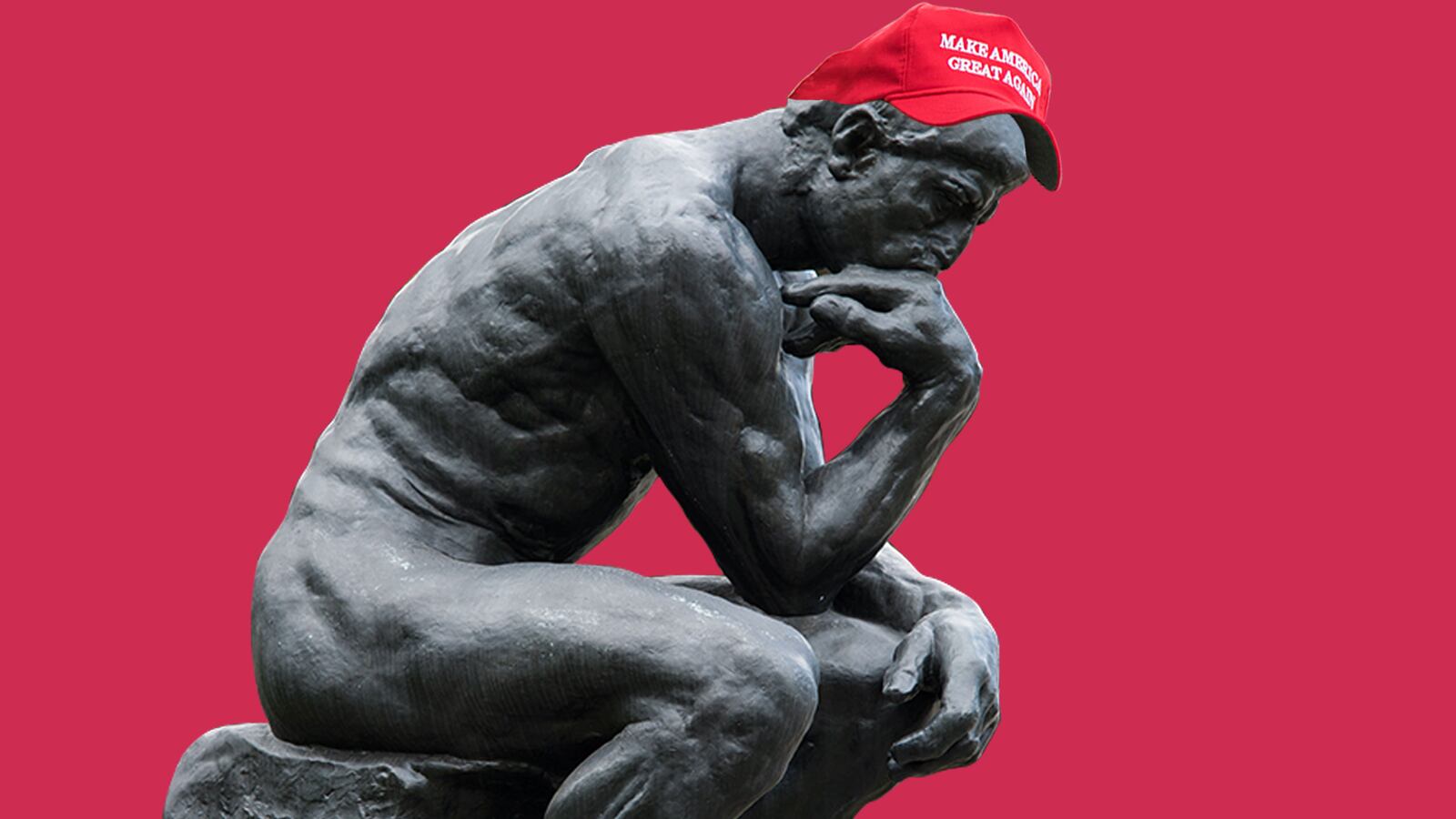Donald Trump’s missteps, contradictory statements and strange tweets have become so pervasive that many commentators are predicting either impeachment, or the Congressional enactment of Article 25 of the Constitution. Despite the hopes of columnists Thomas Friedman, Ross Douthat, Bret Stephens and David Brooks at The New York Times alone, none of these alternatives is about to become reality.
So far the Republicans in Congress have decided not to challenge the President, in the hope that their own political agenda will have a chance to become law if he stays in office. Either they stay mum or make minor criticisms of some of Trump’s behavior that don’t have much of a sting.
Their behavior is to be expected of politicians. But there is a significant group of conservatives who are playing the role of intellectual enablers of Donald Trump; the influential group of conservative thinkers and writers associated with The Claremont Review of Books (CRB), Hillsdale College, the website American Greatness and the policy journal American Affairs.
These intellectuals have been taken on in a consequential article by Andrew Sullivan. Writing about CRB editor Charles Kesler, whom he interviewed, Sullivan asks, “What on earth was a professor like Kesler doing backing a man who has barely read a book in his life, seems to think Frederick Douglass is still alive, and who’d last less than a few seconds in a Kesler seminar? He smiled a little defensively.” Sullivan knows that Kesler is aware of all of Trump’s faults; nevertheless “he still gambled on a despotic, undisciplined, impulsive former Democrat.”
One would think that Trump’s behavior and the events of the past two weeks would begin to change these intellectuals’ minds, but they have not backed down an inch or rethought any of their arguments. Let me once more quote Sullivan’s summary of the beliefs of the Claremont group:
The Claremont consensus (to put a name on this strain of thought) holds that beneath the veneer of constitutional democracy, we are actually governed by a soft despotism of permanent experts, bureaucrats, pundits, and academics who ignore the majority of the American people. This elite has encouraged a divisive social transformation of the country, has led us into disastrous wars, and has created a deepening economic crisis for the middle class. Anyone — anyone — who could challenge this elite’s power was therefore a godsend.
Believing this, the Trumpist intellectuals strain credulity by rationalizing and supporting virtually every outrageous statement made by the President and every policy he backs, even if that policy has not been developed or thought through sufficiently to be taken seriously.
The reality of Trump’s ignorance is precisely what attracts them.
As Ken Masugi asks, “truth to tell, haven’t intellectuals’ influence in politics—with some noble exceptions—been the cause of our major ills in foreign and domestic policy?” Thus, Trump’s crudity and vulgarity is what produces results, and Masugi notes that “Trump speaks as a builder and doer, not as a talker. He is a man who expects to see results, not ponderous statements of subtle complexity.”
I wonder what Masugi thinks of George Kennan’s doctrine of containment, which shaped our foreign policy for decades? That doctrine, written by an intellectual, cannot be written off as a “notable exception;” it established the framework all our presidents used to fight and eventually win the Cold War.
Indeed, it is ironic to that Prof. Mark Bauerlein, author of 2008’s The Dumbest Generation: How the Digital Age Stupefies Young Americans and Jeopardizes Our Future, finds Trump’s ignorance heartening. I agree with his observation that “Feminists, multiculturalists, and globalists have turned the American heritage into a dubious past that is to be overcome by a progressive present.” But I leave him when he argues that Trump’s victory means a reaffirmation of the American heritage.
There are, I think, several reasons so many of Hillary Clinton’s “deplorables” poured into Trump’s rallies. These were largely the forgotten white working-class, the people who although they did the right thing can no longer find work, see their communities hollowed out, and now face a growing opioid epidemic. I do not think they rushed to Trump because “they might escape the shadow of political correctness and take pride in the American heritage.”
Even if Bauerlein is right that people “don’t want to be scolded for their patriotism,” as Obama often did by implication, and want to find “past materials of inspiration,” how does anyone think that outcome will occur when Donald Trump shows that he literally knows nothing about our country’s history and is likely to never have read a serious book on the subject?
Most shocking is that none of these Trumpist intellectuals acknowledge that in many ways, Trump has already undermined the foundations of American democracy. He has shown that he is unaware of the separation of powers by attacking the judicial branch when he disagrees with its rulings, referring to its members as “so-called judges,” and by consistently attacking an independent press as the “enemy of the people,” using the very same term Stalin did in the heyday of his totalitarian rule.
Trump’s entire oeuvre is based on his campaign promise that he alone can fix things, since he “knows more than the generals;” has referred to the U.S. intelligence community as “Nazis,” and who relies on ideologues like Stephen Bannon, Steve Miller and Michael Anton.
What these pro Trump intellectuals fall back on is spelled out by the influential conservative historian Victor Davis Hanson, who writes that “Trump’s character defects have not so far derailed his conservative agenda, in some part because many of those who hate him—the media, academics, and the progressives—have acted so unhinged that they themselves have lost all credibility and now seem to belong in the pages of the National Enquirer.”
The Trump critics belong in the Enquirer’s pages? Is Hanson kidding? Trump says many things that in fact originate in that publication, whose owner is a major Trump supporter. Remember the calumny about Ted Cruz’s father and his would-be role in the Kennedy assassination? As for Trump’s conservative agenda, these intellectuals must stop pointing to their one victory, Judge Gorsuch. In a sane environment, many Democrats would have voted for his appointment, as they did when he was nominated to a lower court. But any ruling Gorsuch might make that favors a position conservatives stand for is hardly sufficient to justify keeping an incompetent and dangerous man in the White House.
Hanson regularly writes Trump defenses for both National Review and PJ Media as well, and like other conservatives, he often argues against Hillary Clinton and what damage she might have done had she won the election. What might have occurred had Hillary Clinton won cannot be an argument for the horrendous things Trump is doing at present. Hanson, however, complains that Trump’s critics ignore his many accomplishments, concentrating only on his character, vulgarity and boorishness. “A flawed character,” Hanson argues, “has a better chance of enacting key conservative correctives than did his occasionally moral superiors—a paradox to be explored by reasoned conservative audit rather than through hysteria or self-referential snark.”
Yes, Trump did start up the Keystone pipeline, appoint Judge Gorsuch, and yes immigration has fallen, but it had started to fall before Trump was elected. Trump is also not making much progress on building his promised wall, and if it is ever built Mexico will not be paying for it. Hanson does not mention the disastrous failure of the Republican antidote to Obamacare, which at present, appears will be dead in the Senate.
Hanson, like other defenders, point accurately to the violence of far-left protestors, the way-out arguments of some on the left—-like historian Timothy Snyder, who sees fascism on the horizon-—and Hillary Clinton’s use of the term “Resistance” to make her appear analogous to the anti-Nazi French partisans during WWII. But writing in National Review, David French correctly argues that Trump lied to the American people about the reasons for his firing of James Comey, and “No amount of Democratic hysteria can make that right. There is no amount of leftist hypocrisy that makes that acceptable.”
Finally, there is one other enabler of Donald Trump who may have alone made the election of Trump possible. That is the legacy the late Roger Ailes left with Fox News. Here I agree with the description of the network by conservative columnist Mona Charen, who writes that it has become “the Trump Ministry of Information — minimizing every mistake, justifying every outrage as a legitimate response to the ‘media frenzy’ against him, and highlighting every hot-button news story that can enrage/frighten viewers about campus authoritarians, illegal immigrants, terrorists, and Democrats.”
By creating a network for “the rest of America” that was ignored by the major networks, Ailes restored balance to a media heavily on the left-liberal side. But as time went on, Fox’s emphasis changed while Ailes was still in command and became a cheering squad, first for the Tea Party, and later for the populist Trump campaign.
Without Fox News, I think it can be assumed that Donald Trump would not have been able to win the White House. Ailes went to his death as the most important enabler of our new, deeply flawed president.





